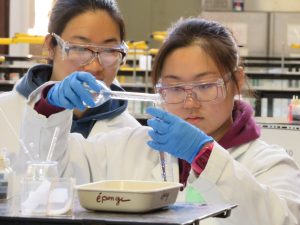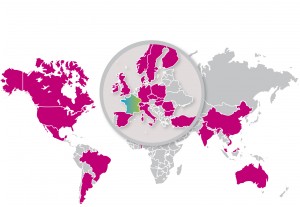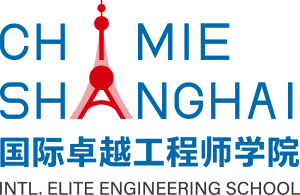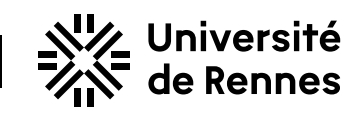 The aim of this espace specifically dedicated to international awareness is to:
The aim of this espace specifically dedicated to international awareness is to:
give practical replies to questions from foreign school-leavers, undergraduates, students on placement, PhD and post-doctoral students arriving at the ENSCR (inward flow) ;
inform, advise and support French or foreign school-leavers, undergraduates and PhD students, at of the ENSCR in their international initiatives and projects (outward flow);
and in general make the ENSCR visible and attractive on the world scène.
International policy
 Awareness of other cultures and other ways of living, working and thinking is essential in the engineering profession.
Awareness of other cultures and other ways of living, working and thinking is essential in the engineering profession.
In order to train engineers who are able to work and communicate within an international context, the ENSCR has placed the acquisition of international skills at the heart of its training courses.
These skills are recognised as having crucial value in the development of an engineering career. This is why now, all engineering students must master one or more foreign languages during their training and develop listening and communication skills by capitalising on their varied experience acquired abroad.
In the foundation courses, two languages are compulsory: English and German/Spanish or English and French as a foreign language (French as a foreign language, provided for foreign students). Other languages may be offered where appropriate (Arabic, Chinese, Italian, Japanese, Portuguese and Russian).
In the engineering courses, the emphasis is on English (preparation for the TOEIC). A second modern language is optional.
To find out more about Education at the ENSCR
Master’s degrees for foreign students
Foreign students may take Master’s degrees in three specialisms preparing for jobs in research:
Molecular Chemistry
Solid state and materials chemistry
Water quality and treatment
These Master’s degrees may lead to jointly supervised theses
PhD courses for foreign students
Research is a basically international activity. All ENSCR laboratories are aware of this and have been able to develop productive dynamic international collaborations that take the form of:
des jointly supervised theses
welcoming post-doctoral students
becoming involved in European research programmes
high-ranking international publications
registering international patents
The ENSCR’s International Relations Department helps research teams with their international co-operation and offers occasional help with logistical problems. The Department of languages provides French as a foreign language courses for all foreign PhD students and research scientists.
International partnerships
The ENSCR has a wide network of partners who provide help with the international movement of its students.
Placements and periods of study abroad are the cornerstone of our international education policy because they offer unique opportunities to engineering students to learn about and experience other life-styles or forge social relationships.
Nowadays, periods of placement or exchanges abroad have become almost indispensable in any course since they undoubtedly, contribute to the professional and intellectual development and fulfilment for engineering students.

Special activities
The ENSCR has been exporting its expertise throughout the world for several years within its active instructional design policy. The school is involved in ambitious training programmes with emerging countries.
This commitment is shown in several ways.
A key element of our European policy is the strengthening of our cooperation with Germany, the engine of European integration and France’s main trading partner, offering real opportunities for our graduates in the field of chemistry. This ambition is nourished by the opportunities presented by the integrated curriculum of the Franco-German University (UFA/DFH) of which we are part in partnership with the ECPM of Strasbourg and the universities of Dresden, Saarbrücken and Stuttgart. The international incoming and outgoing mobility is encouraged by this program for students interesting by doing a mobility for one semester or in double diploma.
Franco-Chinese training programme (engineering  degree-master’s degree). Led by the ENSCR on behalf of the Gay Lussac Federation (FGL) and the East China University of Science and Technology of Shanghai (ECUST), the Shanghai Chemistry program aims to train chemical engineers in 6 years. The first 3 years take place at the Chinese University with scientific teaching and learning of the French language, then the following 3 years in FGL schools.
degree-master’s degree). Led by the ENSCR on behalf of the Gay Lussac Federation (FGL) and the East China University of Science and Technology of Shanghai (ECUST), the Shanghai Chemistry program aims to train chemical engineers in 6 years. The first 3 years take place at the Chinese University with scientific teaching and learning of the French language, then the following 3 years in FGL schools.
Five-year training courses for engineers in oil companies: Total Exploitation and Production (TEP) Yemen, TEP Uganda, Petrovietnam and Petronas (Malaysia) and the Malaysian government (SFERE-JPA Malaysia programme).


